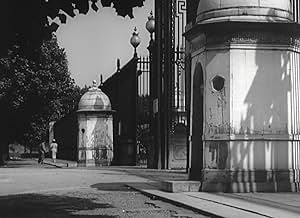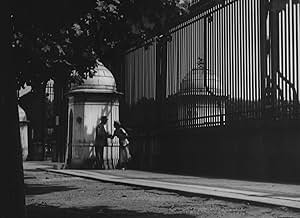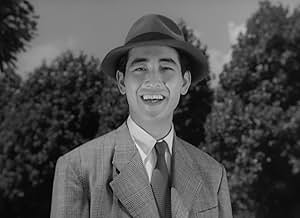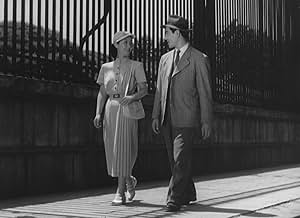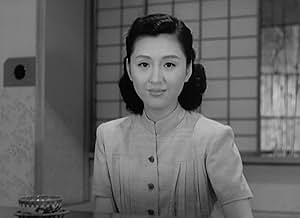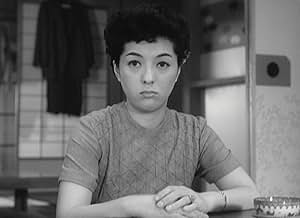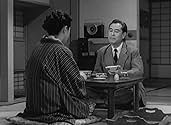NOTE IMDb
7,6/10
4,1 k
MA NOTE
Un couple d'âge mûr sans enfant affronte une crise conjugale.Un couple d'âge mûr sans enfant affronte une crise conjugale.Un couple d'âge mûr sans enfant affronte une crise conjugale.
- Réalisation
- Scénario
- Casting principal
- Récompenses
- 1 victoire au total
Avis à la une
Ozu continues to unfold a worldview of melancholy joy. Here we are offered an insight of what informs this: the glum husband wants things that are 'intimate, primitive, familiar and relaxed', from his brand of cigarettes to pouring tea over his dinner of rice.
So it seems Ozu gravitates towards his camera and world not from deep introspection or need for formalism but towards an intuition.
The benefit is that he naturally envelops space. He doesn't construct it, each visual scene is a soft pencil-stroke tracing and re-tracing paths as a way of arriving at shape.
Some kind of life emerges. In the scenes of the wife lounging with her friends in a spa around a table with drinks and then lazily feeding the fish in a pond, or the two army buddies reminiscing about a beach in Singapore during war with its palm trees, a melancholy breeze blows through it carrying sense, life, contact, memory, evocation. Individually there are wonderful visual moments here, some of the best in his films.
(In all this, he's in line with the great tea master Rikyu's instructions about serving tea, whose name appears in the film. It should not be a lavish or formal ceremony, but sparse and intimate, looking for spontaneous appreciation of what two people relaxing in each other's presence can inspire. Serving tea is merely the opportunity, the framework for contact.)
The flipside of that intuitive approach is that it's enough for Ozu to sketch as he goes. The idea is that life is a bit like this, apparent only in retrospect. He does have in mind a larger transition: a marriage that has grown cold and distant, the lonely night of breaking them apart and, as the man's flight is unexpectedly cancelled, their coming together again in the empty house.
This is a great great notion, the idea that you can create an entire life and for this to slowly crystallize realization in a single moment between two people. It resembles more clearly than any of his other films where Cassavetes would take this mentality in his Woman.
Ozu had tried this several times. For whatever reason, probably a rushed production, he's not in control of it here. This is the most disjointed of his films, a real mess. The ending is possibly the worst work Ozu has done, the wife now enlightened about the purpose of marriage explaining to the young girl (and through her to young women in the audience).
So it seems Ozu gravitates towards his camera and world not from deep introspection or need for formalism but towards an intuition.
The benefit is that he naturally envelops space. He doesn't construct it, each visual scene is a soft pencil-stroke tracing and re-tracing paths as a way of arriving at shape.
Some kind of life emerges. In the scenes of the wife lounging with her friends in a spa around a table with drinks and then lazily feeding the fish in a pond, or the two army buddies reminiscing about a beach in Singapore during war with its palm trees, a melancholy breeze blows through it carrying sense, life, contact, memory, evocation. Individually there are wonderful visual moments here, some of the best in his films.
(In all this, he's in line with the great tea master Rikyu's instructions about serving tea, whose name appears in the film. It should not be a lavish or formal ceremony, but sparse and intimate, looking for spontaneous appreciation of what two people relaxing in each other's presence can inspire. Serving tea is merely the opportunity, the framework for contact.)
The flipside of that intuitive approach is that it's enough for Ozu to sketch as he goes. The idea is that life is a bit like this, apparent only in retrospect. He does have in mind a larger transition: a marriage that has grown cold and distant, the lonely night of breaking them apart and, as the man's flight is unexpectedly cancelled, their coming together again in the empty house.
This is a great great notion, the idea that you can create an entire life and for this to slowly crystallize realization in a single moment between two people. It resembles more clearly than any of his other films where Cassavetes would take this mentality in his Woman.
Ozu had tried this several times. For whatever reason, probably a rushed production, he's not in control of it here. This is the most disjointed of his films, a real mess. The ending is possibly the worst work Ozu has done, the wife now enlightened about the purpose of marriage explaining to the young girl (and through her to young women in the audience).
This film mines much of the territory of Ozu films, including the complex relationships of the major characters, the resistance of a young lady to agree to an arranged marriage and the aesthetics of everyday living amongst the working classes. The film has two main stories, parallel to each other, running through it: Takeo, who is bored with her husband who is very simple in his needs, lies to him so she can go to a spa with her friends. Their niece, the pretty Setsuko, is the one who is resisting the arranged marriage meeting. How the two stories bisect is typical Ozu, creating conflict and anger. This film is not as good as much of Ozu's output at the time, but that includes "Tokyo Story", "Early Summer" and "Late Spring", which are standout classics. The great Setsuko Hara is not in this film and the equally great Chishu Ryu is a bit player, but I think you'll still find this film worthy of your time. If you haven't seen an Ozu film, start with "Tokyo Story" or "Late Spring" (others too, including "Good Morning" and "Autumn Afternoon") but give this a try. I don't think you will be disappointed.
The Flavour of Green Tea over Rice (Ochazuke no aji) is an Ozu film; a subdued drama analyzing the transformation of Japan post-WWII in small, personal ways. This film follows a childless married couple as they navigate changing traditions, conceptions of marriage, and love. The relationship between the two is strained - the husband is a simple country man who enjoys his country cigarettes, riding in the third class passenger car of trains, and throwing himself into his work with tact and politeness. The wife is a city girl, enjoying spa days, expensive and luxurious decorations, and first class train rides. These two struggle to relate to each other, in a marriage that was set up over a decade ago as an arranged marriage.
The catalyst to this film is when their headstrong niece comes to stay. A product of the new Japan, she is not interested in an arranged marriage, and instead wants to meet someone through dating, and marry for love, not familial status. This is scandalous to both her parents and our married couple. However, the two begin to see each other in a new light, engaging with new ideas, trying new things, and ultimately coming together in a touching and mute scene of culinary exploration and intimacy.
Ozu has a way with scenes. Each scene is meticulously detailed, and dripping with meaning, while maintaining a muted, quite feel. Ozu is, of course, a master of film making of this era, and this film is no different. It poignantly portrays the changing nature of relationships, love and marriage in Japan with subtlety, grace, and beauty. There are many wonderful scenes and shots in this film, and it is an Ozu film worth watching.
Complaints-wise, this film feels much slower then many of Ozu's films, almost to the point of not really moving. This seems to be a stylistic choice that compliments the thesis of the film, but also makes the film a bit distractable at times. Scenes feel like they jump at times, and the chronology of events, while supposed to be clear, is often not, for brief moments.
A wonderful film in many ways that just, barely, lacks the Ozu charm and perfection that is common in films like Tokyo Story, for example. Even so, this is a lovely, sweet and touching film that is easily watchable, and contains many of the charms of Ozu's work. Easy recommendation for fans of Ozu, or fans of quite, small and beautiful stories and dramas.
The catalyst to this film is when their headstrong niece comes to stay. A product of the new Japan, she is not interested in an arranged marriage, and instead wants to meet someone through dating, and marry for love, not familial status. This is scandalous to both her parents and our married couple. However, the two begin to see each other in a new light, engaging with new ideas, trying new things, and ultimately coming together in a touching and mute scene of culinary exploration and intimacy.
Ozu has a way with scenes. Each scene is meticulously detailed, and dripping with meaning, while maintaining a muted, quite feel. Ozu is, of course, a master of film making of this era, and this film is no different. It poignantly portrays the changing nature of relationships, love and marriage in Japan with subtlety, grace, and beauty. There are many wonderful scenes and shots in this film, and it is an Ozu film worth watching.
Complaints-wise, this film feels much slower then many of Ozu's films, almost to the point of not really moving. This seems to be a stylistic choice that compliments the thesis of the film, but also makes the film a bit distractable at times. Scenes feel like they jump at times, and the chronology of events, while supposed to be clear, is often not, for brief moments.
A wonderful film in many ways that just, barely, lacks the Ozu charm and perfection that is common in films like Tokyo Story, for example. Even so, this is a lovely, sweet and touching film that is easily watchable, and contains many of the charms of Ozu's work. Easy recommendation for fans of Ozu, or fans of quite, small and beautiful stories and dramas.
Michiyo Kogure is discontented with her long marriage to Shin Shiburi. She refers to him as "Mr. Obtuse" to her female relations and friends, and talks them into going on holiday with her, claiming to him that her niece, Keiko Tsushima, is at the resort, suffering from appendicitis; she's probably scared and lonely; and then Miss Tsushima walks in. Miss Tsushima is also a problem. Like many an Ozu woman, she doesn't want to get married yet, and certainly doesn't want an arranged marriage like her aunt. It's so primitive.
It all comes to a head one evening when he's enjoying rice with green tea and his wife doesn't like that way of eating it. He tries to explain that he likes simple, primitive, informal things, like cheap cigarettes and third-class railway tickets and pachinko machines. He understands she likes the 'better' things, and that's fine. And he won't pour tea on his rice any more. Her response is to walk out of the room.
I decided most of the way through that this was Ozu's variation on THE TAMING OF THE SHREW, without any of Petruchio's cruelty.... at least on the part of Mr. Shiburi. The studied cruelty is exhibited, in truth by Miss Kogure. There's not a cruel bone in Shiburi's body. He tries to get his niece to do the right thing simply by talking. He's remembered fondly by a member of his old army squadron as kind; he's sponsoring Kôji Tsuruta for a job at his company because he's the brother of an old high-school friend who got killed in the war. Perhaps Kate is a combination of Miss Kogure and Miss Tsushima.
The transformation of Ozu's style from before the war is almost complete. Gone are the American movie posters, although there's some discussion of a Jean Marais film; and the camera sticks pretty close to the floor, although there is one pull-in at the end of a scene, after the players have left. I'm not sure what that is supposed to mean.
It all comes to a head one evening when he's enjoying rice with green tea and his wife doesn't like that way of eating it. He tries to explain that he likes simple, primitive, informal things, like cheap cigarettes and third-class railway tickets and pachinko machines. He understands she likes the 'better' things, and that's fine. And he won't pour tea on his rice any more. Her response is to walk out of the room.
I decided most of the way through that this was Ozu's variation on THE TAMING OF THE SHREW, without any of Petruchio's cruelty.... at least on the part of Mr. Shiburi. The studied cruelty is exhibited, in truth by Miss Kogure. There's not a cruel bone in Shiburi's body. He tries to get his niece to do the right thing simply by talking. He's remembered fondly by a member of his old army squadron as kind; he's sponsoring Kôji Tsuruta for a job at his company because he's the brother of an old high-school friend who got killed in the war. Perhaps Kate is a combination of Miss Kogure and Miss Tsushima.
The transformation of Ozu's style from before the war is almost complete. Gone are the American movie posters, although there's some discussion of a Jean Marais film; and the camera sticks pretty close to the floor, although there is one pull-in at the end of a scene, after the players have left. I'm not sure what that is supposed to mean.
Ozu marriage stories are one of the best ones. He really hits you with his deep and truthful dialogues. I loved the cinematography and the use of shadows. Also, I got hungry watching this.
Le saviez-vous
- AnecdotesAt the start of the film, two characters mention going to see a new film with Jean Marais. The film was most likely Orphée (1950), which was released in Japan in June 1951.
- Citations
Taeko Satake: Think well before you pick your groom, it's important.
- ConnexionsFeatured in David Bordwell on 'The Flavor of Green Tea Over Rice' (2019)
- Bandes originalesLove's Old Sweet Song
Composed by J.L. Molloy (as James Lyman Molloy)
Meilleurs choix
Connectez-vous pour évaluer et suivre la liste de favoris afin de recevoir des recommandations personnalisées
- How long is The Flavor of Green Tea Over Rice?Alimenté par Alexa
Détails
- Date de sortie
- Pays d’origine
- Langue
- Aussi connu sous le nom de
- The Flavor of Green Tea Over Rice
- Lieux de tournage
- Société de production
- Voir plus de crédits d'entreprise sur IMDbPro
- Durée
- 1h 56min(116 min)
- Couleur
- Mixage
- Rapport de forme
- 1.37 : 1
Contribuer à cette page
Suggérer une modification ou ajouter du contenu manquant

